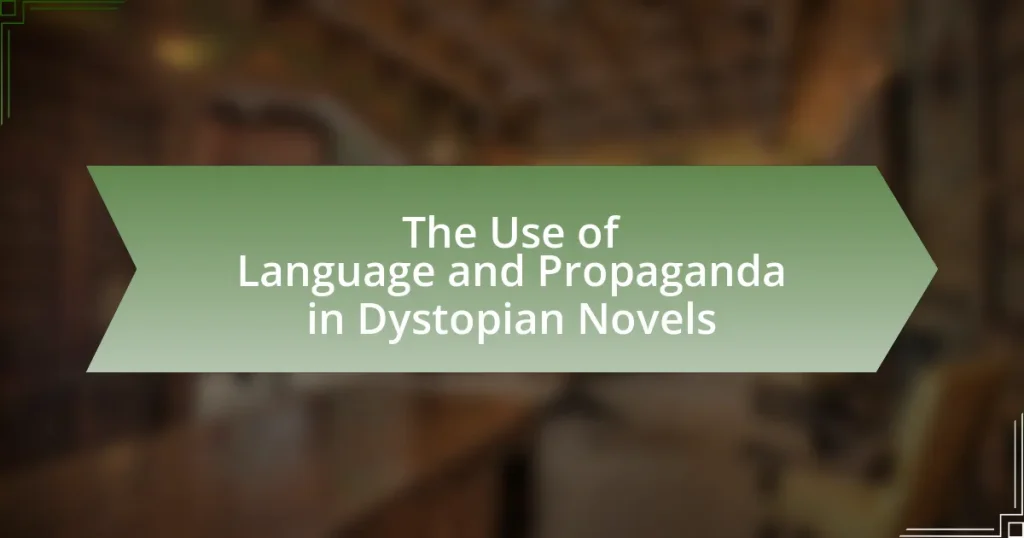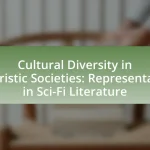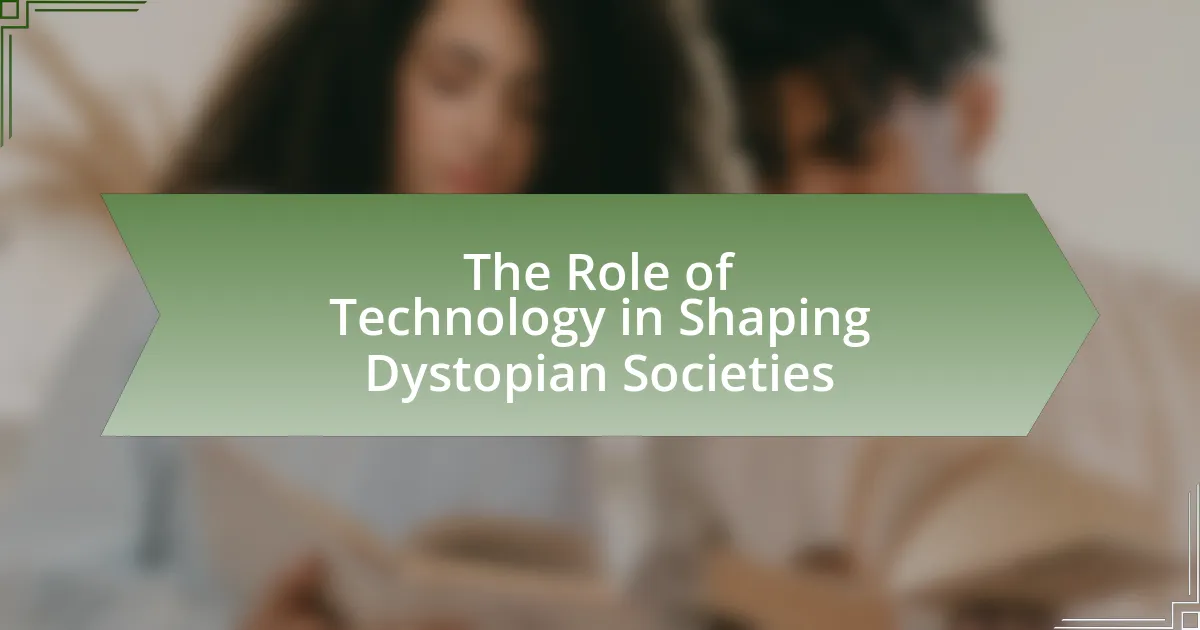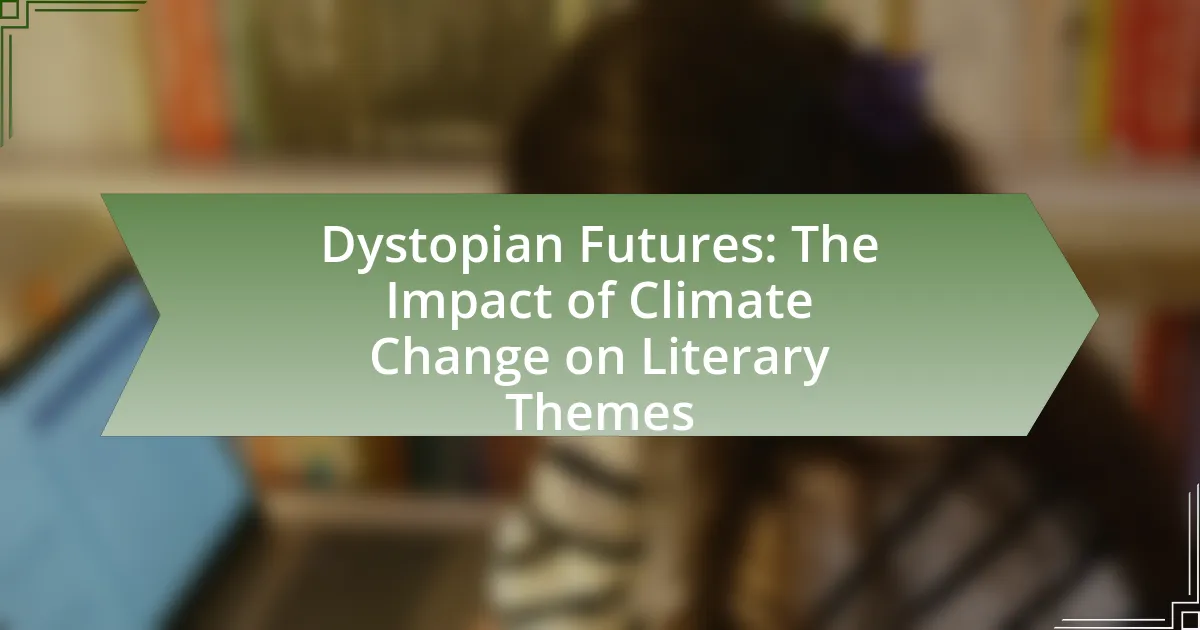The article examines the critical role of language and propaganda in dystopian novels, highlighting how these elements serve as tools for control and manipulation within oppressive societies. It discusses the techniques authors use to shape narratives, such as Newspeak and euphemism, and explores the psychological impacts of propaganda on characters and societal norms. The article also analyzes historical contexts influencing these portrayals and the implications for understanding real-world issues related to language manipulation and censorship. Through examples from classic and contemporary literature, it underscores the significance of language in shaping thought and maintaining authority in dystopian settings.
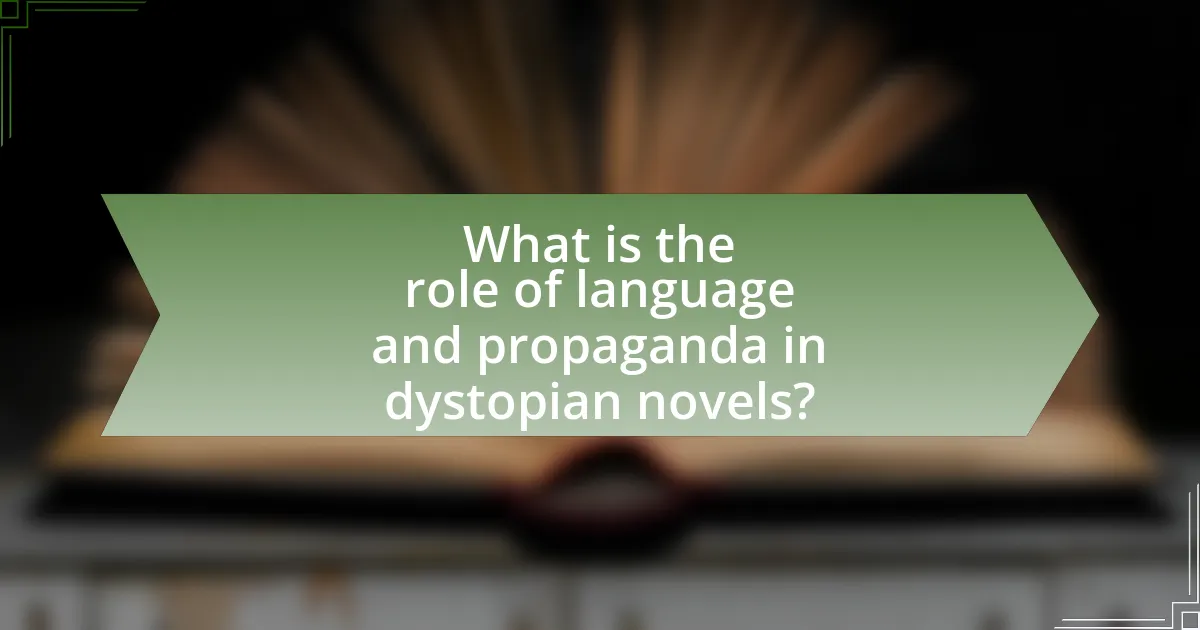
What is the role of language and propaganda in dystopian novels?
Language and propaganda serve as crucial tools for control and manipulation in dystopian novels. These elements shape societal norms, influence thought processes, and suppress dissent by altering the way individuals perceive reality. For instance, in George Orwell’s “1984,” the concept of Newspeak exemplifies how language can be engineered to limit freedom of thought, effectively reducing the range of ideas that can be expressed. This manipulation of language is a form of propaganda that reinforces the power of the ruling regime, demonstrating that control over language equates to control over the populace. Additionally, propaganda in these narratives often employs emotional appeals and misinformation to maintain authority and justify oppressive measures, as seen in Ray Bradbury’s “Fahrenheit 451,” where the government uses media to promote anti-intellectualism and censorship. Thus, language and propaganda are integral to the mechanisms of oppression in dystopian literature, illustrating the profound impact of communication on societal structure and individual autonomy.
How do authors use language to shape the narrative in dystopian settings?
Authors use language to shape the narrative in dystopian settings by employing specific linguistic techniques that create atmosphere, convey themes, and manipulate characters’ perceptions. For instance, the use of stark, oppressive vocabulary can evoke feelings of fear and hopelessness, as seen in George Orwell’s “1984,” where terms like “Newspeak” and “thoughtcrime” illustrate the regime’s control over reality. Additionally, authors often utilize metaphor and symbolism to deepen the narrative; in Aldous Huxley’s “Brave New World,” the phrase “soma” symbolizes the use of technology and drugs to suppress individuality and maintain societal order. These linguistic choices not only enhance the emotional impact of the story but also serve to critique real-world issues, such as totalitarianism and consumerism, thereby reinforcing the narrative’s central themes.
What techniques are employed to manipulate language in these novels?
Dystopian novels employ techniques such as Newspeak, doublespeak, and euphemism to manipulate language. Newspeak, as seen in George Orwell’s “1984,” reduces the complexity of language to limit thought and expression, thereby controlling the populace. Doublespeak, used in various dystopian contexts, obscures truth and misleads through ambiguous language, making harmful actions appear benign. Euphemism softens harsh realities, allowing oppressive regimes to mask their actions, as illustrated in Aldous Huxley’s “Brave New World,” where terms like “conditioning” disguise the manipulation of individuals. These techniques collectively serve to distort reality and suppress dissent, reinforcing the power of authoritarian regimes.
How does the choice of words influence the reader’s perception of the dystopian world?
The choice of words significantly shapes the reader’s perception of the dystopian world by evoking specific emotions and imagery. For instance, the use of harsh, clinical language can create a sense of oppression and dehumanization, while vivid, descriptive terms can immerse the reader in the bleakness of the setting. In George Orwell’s “1984,” the term “Newspeak” exemplifies how language manipulation alters reality and controls thought, reinforcing the oppressive nature of the regime. This linguistic control not only reflects the dystopian environment but also influences the reader’s emotional response, making them more aware of the consequences of totalitarianism. Thus, the deliberate selection of words serves as a powerful tool in conveying the themes and atmosphere of dystopian narratives.
Why is propaganda a central theme in dystopian literature?
Propaganda is a central theme in dystopian literature because it serves as a tool for oppressive regimes to manipulate and control the populace. In works like George Orwell’s “1984,” the government employs propaganda to alter reality, suppress dissent, and maintain power through the concept of “Newspeak,” which limits language and thought. This manipulation of information illustrates how language can be weaponized to create a false narrative, ensuring that citizens remain compliant and unaware of their subjugation. The prevalence of propaganda in these narratives highlights the dangers of unchecked authority and the critical role of language in shaping societal beliefs and behaviors.
What are the historical contexts that influence the portrayal of propaganda in these novels?
The historical contexts that influence the portrayal of propaganda in dystopian novels include totalitarian regimes, the Cold War, and the rise of mass media. Totalitarian regimes, such as those seen in Nazi Germany and Stalinist Russia, serve as a backdrop for the exploration of state-controlled narratives and the manipulation of truth, as depicted in novels like George Orwell’s “1984.” The Cold War era introduced themes of ideological warfare and surveillance, which are reflected in works like Aldous Huxley’s “Brave New World,” where propaganda is used to maintain social order and control. Additionally, the advent of mass media and technology has shaped the portrayal of propaganda, highlighting the ease with which information can be disseminated and distorted, as seen in contemporary dystopian literature. These contexts provide a framework for understanding how propaganda is utilized to influence public perception and maintain power within these fictional societies.
How does propaganda serve to control or influence characters within the story?
Propaganda serves to control or influence characters within the story by shaping their beliefs and perceptions through manipulated information. In dystopian novels, characters often encounter state-sponsored messages that distort reality, leading them to accept oppressive ideologies as truth. For example, in George Orwell’s “1984,” the Party employs slogans like “War is Peace” to create cognitive dissonance, forcing characters to reconcile contradictory beliefs, thereby ensuring their compliance. This manipulation of language and information restricts independent thought and reinforces the power of the ruling authority, demonstrating how propaganda effectively maintains control over individuals.
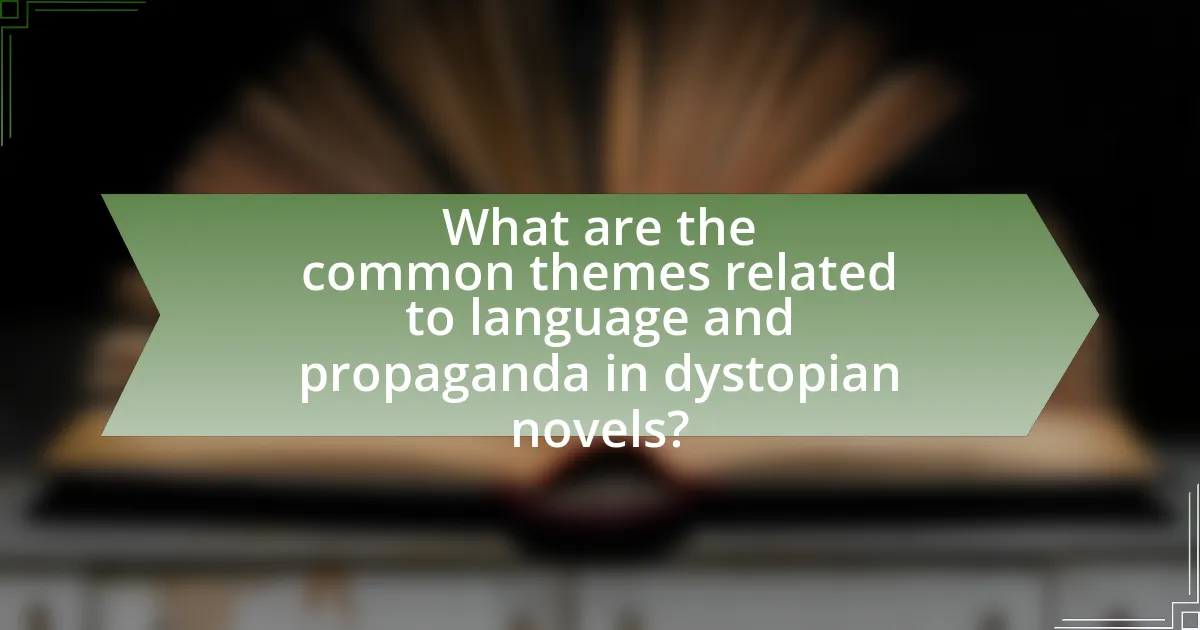
What are the common themes related to language and propaganda in dystopian novels?
Common themes related to language and propaganda in dystopian novels include the manipulation of truth, the simplification of language, and the use of euphemisms to control thought. Dystopian narratives often depict regimes that alter language to limit freedom of expression and critical thinking, exemplified by George Orwell’s “1984,” where Newspeak is designed to eliminate rebellious thoughts. Additionally, propaganda in these novels frequently employs emotional appeals and misinformation to maintain power, as seen in Ray Bradbury’s “Fahrenheit 451,” where the suppression of literature serves to control societal beliefs. These themes illustrate how language can be weaponized to shape reality and enforce conformity within oppressive societies.
How does censorship manifest in the language used in dystopian narratives?
Censorship in dystopian narratives manifests through the manipulation of language to control thought and suppress dissent. Authors often depict regimes that restrict vocabulary, as seen in George Orwell’s “1984,” where the concept of Newspeak reduces the range of expression, limiting the ability to articulate rebellious thoughts. This linguistic control serves to reinforce the power of the state by making subversive ideas literally unspeakable. Additionally, euphemisms are frequently employed to obscure harsh realities, such as referring to oppressive actions as “re-education” or “enhanced interrogation,” which further illustrates how language is weaponized to maintain authority and manipulate public perception.
What are the effects of censorship on communication and thought in these societies?
Censorship significantly restricts communication and thought in societies, leading to a homogenization of ideas and suppression of dissent. This restriction results in a lack of diverse perspectives, as individuals are unable to freely express their thoughts or access information that challenges the status quo. For instance, in George Orwell’s “1984,” the government employs Newspeak to limit the range of thought, demonstrating how language manipulation can control and constrain individual cognition. Historical examples, such as the censorship in totalitarian regimes like Nazi Germany and Stalinist Russia, illustrate that such practices lead to widespread propaganda, where only state-sanctioned narratives are disseminated, further entrenching ideological conformity and stifling critical thinking.
How do characters respond to censorship in their use of language?
Characters in dystopian novels often respond to censorship by subverting language to express dissent and reclaim agency. For instance, in George Orwell’s “1984,” Winston Smith utilizes Newspeak’s limitations to articulate forbidden thoughts, demonstrating how characters manipulate language to resist oppressive regimes. This manipulation serves as a form of rebellion against the imposed restrictions, highlighting the power of language as a tool for both control and liberation. The act of creating or using alternative expressions, as seen in various dystopian narratives, underscores the resilience of human expression in the face of censorship.
What role does propaganda play in shaping societal norms and values?
Propaganda plays a crucial role in shaping societal norms and values by influencing public perception and behavior through targeted messaging. It serves to reinforce specific ideologies, often aligning with the interests of those in power, thereby normalizing certain beliefs and practices within a society. Historical examples, such as the use of propaganda in Nazi Germany, illustrate how state-sponsored messaging can manipulate public opinion, leading to widespread acceptance of discriminatory policies and actions. Additionally, research by scholars like Edward Bernays highlights how propaganda can be used to engineer consent, demonstrating its effectiveness in altering societal values and norms over time.
How do dystopian societies utilize propaganda to maintain power?
Dystopian societies utilize propaganda to maintain power by controlling information and shaping public perception. These regimes often disseminate false narratives, glorify the state, and demonize dissent to manipulate citizens’ beliefs and behaviors. For instance, in George Orwell’s “1984,” the Party employs slogans like “War is Peace” to create cognitive dissonance, ensuring that citizens accept contradictory ideas, which reinforces their loyalty and compliance. Additionally, propaganda is used to instill fear and promote a sense of unity against perceived enemies, as seen in the constant surveillance and control depicted in dystopian literature. This systematic manipulation of language and information effectively suppresses opposition and consolidates the ruling authority’s grip on society.
What are the psychological impacts of propaganda on individuals in these novels?
The psychological impacts of propaganda on individuals in dystopian novels include manipulation of beliefs, alteration of identity, and desensitization to violence. Propaganda often instills a sense of fear and dependency on the state, leading individuals to conform to imposed ideologies. For example, in George Orwell’s “1984,” the constant surveillance and misinformation create a reality where individuals lose their ability to think critically, resulting in cognitive dissonance and emotional numbness. Similarly, in Aldous Huxley’s “Brave New World,” the use of pleasure as a form of control leads to a superficial existence, where genuine emotions and connections are suppressed. These narratives illustrate how propaganda can distort reality, erode personal autonomy, and foster a culture of compliance, ultimately affecting mental health and societal cohesion.
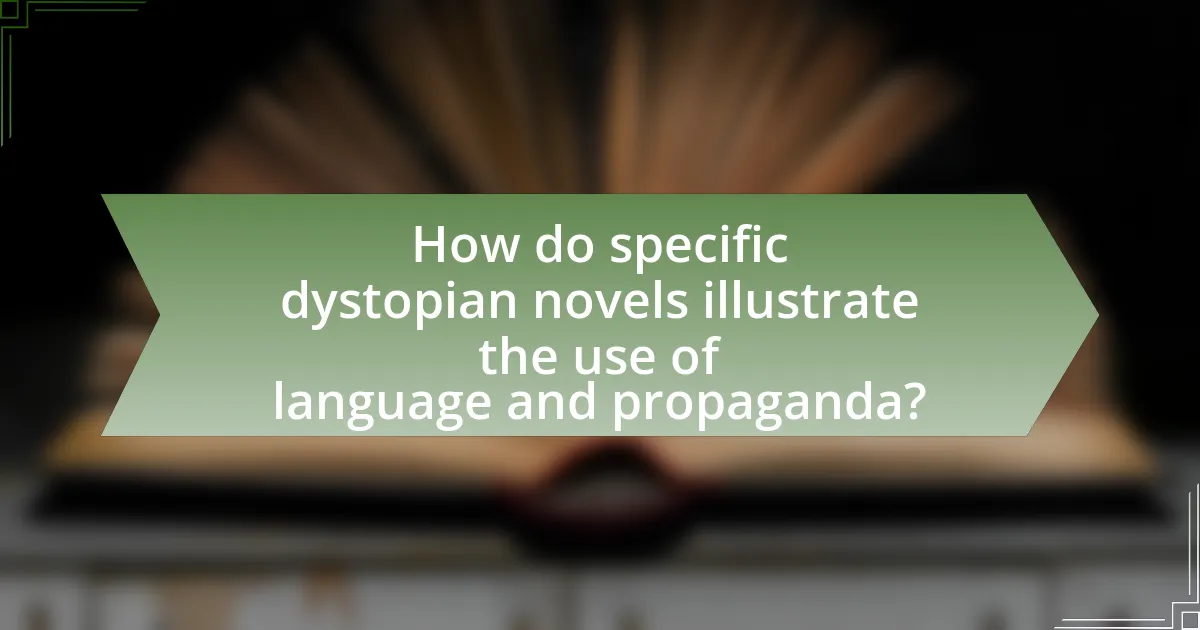
How do specific dystopian novels illustrate the use of language and propaganda?
Specific dystopian novels illustrate the use of language and propaganda by demonstrating how language can manipulate thought and control society. In George Orwell’s “1984,” the concept of Newspeak exemplifies this, as it reduces the complexity of language to limit freedom of thought, effectively serving the Party’s propaganda goals. Similarly, in Aldous Huxley’s “Brave New World,” the use of euphemisms and conditioning illustrates how language can be employed to pacify and control the populace, promoting consumerism and conformity. These novels provide concrete examples of how language functions as a tool for oppression, showcasing the relationship between linguistic control and societal manipulation.
What examples can be found in classic dystopian literature?
Classic dystopian literature includes notable examples such as George Orwell’s “1984,” Aldous Huxley’s “Brave New World,” and Ray Bradbury’s “Fahrenheit 451.” In “1984,” the use of Newspeak exemplifies how language can be manipulated to control thought and suppress dissent. Huxley’s “Brave New World” illustrates the use of propaganda through the promotion of consumerism and the suppression of individuality. “Fahrenheit 451” depicts a society where books are banned, showcasing the power of language in shaping culture and thought. These works collectively highlight the critical role of language and propaganda in maintaining oppressive regimes.
How does George Orwell’s “1984” exemplify the manipulation of language?
George Orwell’s “1984” exemplifies the manipulation of language through the concept of Newspeak, a controlled language designed to limit freedom of thought. Newspeak systematically reduces the complexity of language, eliminating words that could express dissent or rebellion, thereby constraining individual thought and promoting conformity. For instance, the term “doublethink” illustrates the ability to hold two contradictory beliefs simultaneously, which is essential for the Party’s control over reality. This manipulation of language serves as a tool for the totalitarian regime to maintain power, as it restricts the populace’s capacity to articulate opposition or even conceive of alternative ideologies.
What role does propaganda play in Aldous Huxley’s “Brave New World”?
Propaganda in Aldous Huxley’s “Brave New World” serves as a crucial mechanism for social control and the maintenance of the state’s stability. The government employs propaganda through slogans, conditioning, and the manipulation of language to ensure conformity and suppress individuality. For instance, the use of phrases like “Community, Identity, Stability” encapsulates the values the society promotes, reinforcing the idea that personal desires are secondary to societal harmony. This systematic indoctrination is evident in the conditioning of infants, where repeated phrases instill acceptance of their predetermined roles, demonstrating how language shapes thought and behavior. Thus, propaganda is integral to the World State’s strategy to eliminate dissent and promote a superficial sense of happiness among its citizens.
How do contemporary dystopian novels address language and propaganda?
Contemporary dystopian novels address language and propaganda by illustrating how language can be manipulated to control thought and behavior. These narratives often depict regimes that employ Newspeak, doublespeak, or other forms of distorted language to limit freedom of expression and critical thinking, as seen in George Orwell’s “1984.” In such works, propaganda is utilized to create a false reality, where the truth is obscured, and citizens are conditioned to accept the state’s narrative without question. For example, in Margaret Atwood’s “The Handmaid’s Tale,” the use of religious language serves to justify oppressive practices, demonstrating how language can be weaponized to reinforce societal norms and maintain power.
What new techniques are authors using to explore these themes in modern works?
Authors are increasingly using metafiction, unreliable narrators, and interactive storytelling to explore themes of language and propaganda in modern dystopian works. Metafiction allows authors to draw attention to the act of storytelling itself, prompting readers to question the reliability of the narrative and the motives behind the language used. Unreliable narrators create ambiguity, forcing readers to discern truth from manipulation, which mirrors the propaganda techniques depicted in the narratives. Interactive storytelling, often seen in digital formats, engages readers in decision-making processes that reflect the themes of control and choice, emphasizing the impact of language on perception and reality. These techniques collectively enhance the exploration of how language shapes societal structures and individual beliefs in dystopian contexts.
How do recent dystopian novels reflect current societal issues through language and propaganda?
Recent dystopian novels reflect current societal issues through language and propaganda by using specific linguistic techniques and narrative strategies to critique and expose real-world problems. For instance, novels like “The Testaments” by Margaret Atwood and “The Power” by Naomi Alderman employ language that mirrors contemporary political rhetoric and social media discourse, highlighting themes of oppression, gender inequality, and authoritarianism. These authors utilize propaganda-like messaging within their narratives to illustrate how language can manipulate public perception and reinforce societal norms, drawing parallels to current events such as the rise of populism and the spread of misinformation. By embedding these elements into their storytelling, these novels serve as a commentary on the dangers of unchecked power and the role of language in shaping societal beliefs and behaviors.
What practical insights can be drawn from the study of language and propaganda in dystopian novels?
The study of language and propaganda in dystopian novels reveals that language can be a powerful tool for manipulation and control. Dystopian narratives often illustrate how regimes use language to distort reality, suppress dissent, and shape public perception. For instance, George Orwell’s “1984” demonstrates the concept of Newspeak, a language designed to limit thought and eliminate rebellious ideas, highlighting the relationship between language and power. This shows that understanding the mechanisms of language can help individuals recognize and resist manipulative rhetoric in real-world contexts. Additionally, the portrayal of propaganda techniques in these novels emphasizes the importance of critical thinking and media literacy, as characters often face dire consequences for failing to question the narratives imposed upon them.
